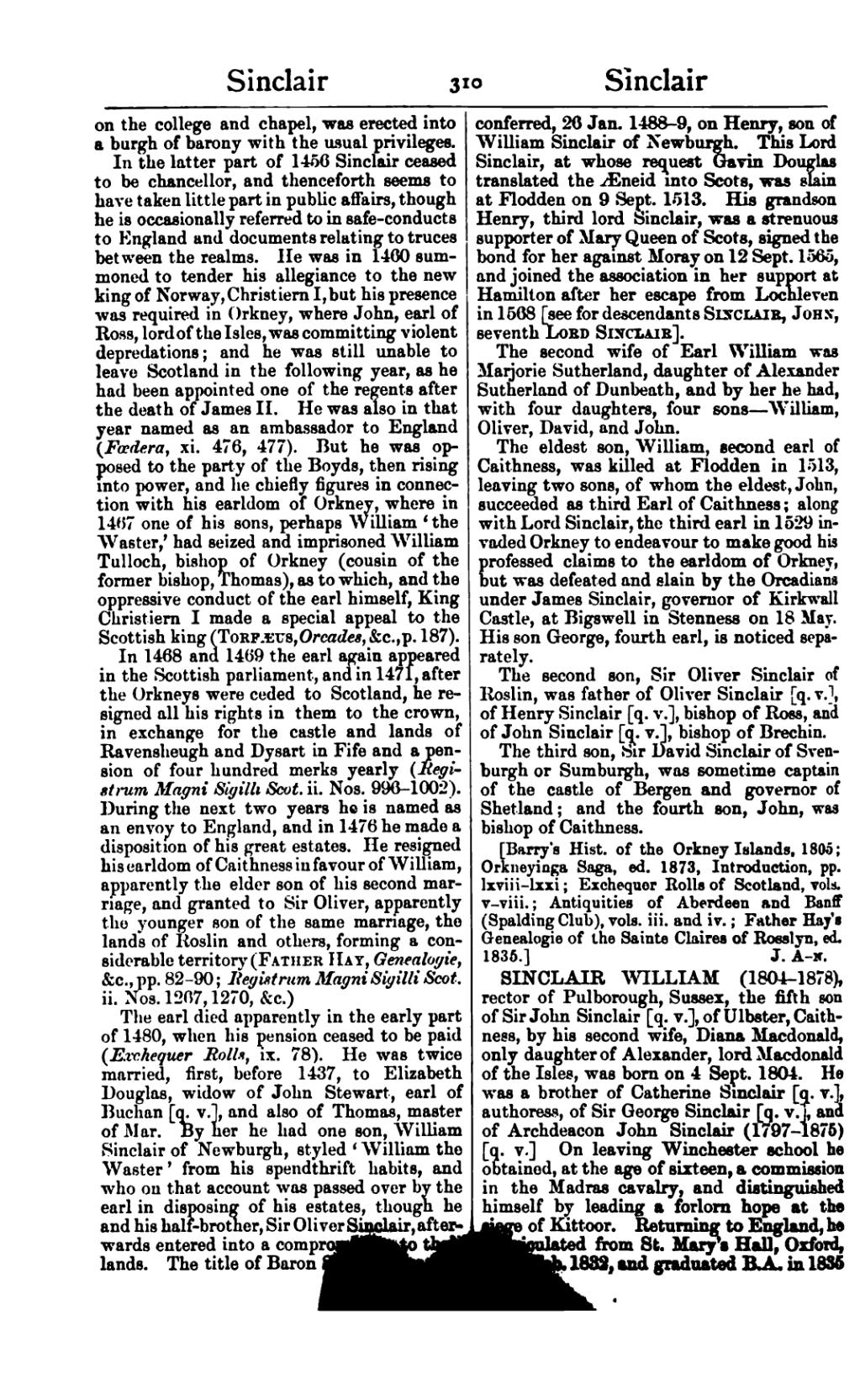on the college and chapel, was erected into a burgh of barony with the usual privileges.
In the latter part of 1456 Sinclair ceased to be chancellor, and thenceforth seems to have taken little part in public affairs, though he is occasionally referred to in safe-conducts to England and documents relating to truces between the realms. He was in 1460 summoned to tender his allegiance to the new king of Norway, Christiern I, but his presence was required in Orkney, where John, earl of Ross, lord of the Isles, was committing violent depredations; and he was still unable to leave Scotland in the following year, as he had been appointed one of the regents after the death of James II. He was also in that year named as an ambassador to England (Fœdera, xi. 476, 477). But he was opposed to the party of the Boyds, then rising into power, and he chiefly figures in connection with his earldom of Orkney, where in 1467 one of his sons, perhaps William ‘the Waster,’ had seized and imprisoned William Tulloch, bishop of Orkney (cousin of the former bishop, Thomas), as to which, and the oppressive conduct of the earl himself, King Christiern I made a special appeal to the Scottish king (Torfæus, Orcades, &c., p. 187).
In 1468 and 1469 the earl again appeared in the Scottish parliament, and in 1471, after the Orkneys were ceded to Scotland, he resigned all his rights in them to the crown, in exchange for the castle and lands of Ravensheugh and Dysart in Fife and a pension of four hundred merks yearly (Registrum Magni Sigilli Scot. ii. Nos. 996–1002). During the next two years he is named as an envoy to England, and in 1476 he made a disposition of his great estates. He resigned his earldom of Caithness in favour of William, apparently the elder son of his second marriage, and granted to Sir Oliver, apparently the younger son of the same marriage, the lands of Roslin and others, forming a considerable territory (Father Hay, Genealogie, &c., pp. 82–90; Registrum Magni Sigilli Scot. ii. Nos. 1267, 1270, &c.).
The earl died apparently in the early part of 1480, when his pension ceased to be paid (Exchequer Rolls, ix. 78). He was twice married: first, before 1437, to Margaret, eldest daughter of Archibald, fourth earl of Douglas, and widow of John Stewart, earl of Buchan [q. v.], and also of Thomas, master of Mar. By her he had a daughter Catharine, who married Alexander Stewart, duke of Albany [q. v.], and one son, William Sinclair of Newburgh, styled ‘William the Waster’ from his spendthrift habits, and who on that account was passed over by the earl in disposing of his estates, though he and his half-brother, Sir Oliver Sinclair, afterwards entered into a compromise as to their lands. The title of Baron Sinclair was first conferred, 26 Jan. 1488–9, on Henry, son of William Sinclair of Newburgh. This Lord Sinclair, at whose request Gavin Douglas translated the Æneid into Scots, was slain at Flodden on 9 Sept. 1513. His grandson Henry, third lord Sinclair, was a strenuous supporter of Mary Queen of Scots, signed the bond for her against Moray on 12 Sept. 1565, and joined the association in her support at Hamilton after her escape from Lochleven in 1568 [see for descendants Sinclair, John, seventh Lord Sinclair].
The second wife of Earl William was Marjorie Sutherland, daughter of Alexander Sutherland of Dunbeath, and by her he had, with four daughters, four sons—William, Oliver, David, and John.
The eldest son, William, second earl of Caithness, was killed at Flodden in 1513, leaving two sons, of whom the eldest, John, succeeded as third Earl of Caithness; along with Lord Sinclair, the third earl in 1529 invaded Orkney to endeavour to make good his professed claims to the earldom of Orkney, but was defeated and slain by the Orcadians under James Sinclair, governor of Kirkwall Castle, at Bigswell in Stenness on 18 May. His son George, fourth earl, is noticed separately.
The second son, Sir Oliver Sinclair of Roslin, was father of Oliver Sinclair [q. v.], of Henry Sinclair [q. v.], bishop of Ross, and of John Sinclair [q. v.], bishop of Brechin.
The third son, Sir David Sinclair of Svenburgh or Sumburgh, was sometime captain of the castle of Bergen and governor of Shetland; and the fourth son, John, was bishop of Caithness.
[Barry's Hist. of the Orkney Islands, 1805; Orkneyinga Saga, ed. 1873, Introduction, pp. lxviii–lxxi; Exchequer Rolls of Scotland, vols. v–viii.; Antiquities of Aberdeen and Banff (Spalding Club), vols. iii. and iv.; Father Hay's Genealogie of the Sainte Claires of Rosslyn, ed. 1835.]
SINCLAIR, WILLIAM (1804–1878), rector of Pulborough, Sussex, the fifth son of Sir John Sinclair [q. v.], of Ulbster, Caithness, by his second wife, Diana Macdonald, only daughter of Alexander, lord Macdonald of the Isles, was born on 4 Sept. 1804. He was a brother of Catherine Sinclair [q. v.], authoress, of Sir George Sinclair [q. v.], and of Archdeacon John Sinclair (1797–1875) [q. v.] On leaving Winchester school he obtained, at the age of sixteen, a commission in the Madras cavalry, and distinguished himself by leading a forlorn hope at the siege of Kittoor. Returning to England, he matriculated from St. Mary's Hall, Oxford, on 29 Feb. 1832, and graduated B.A. in 1835
